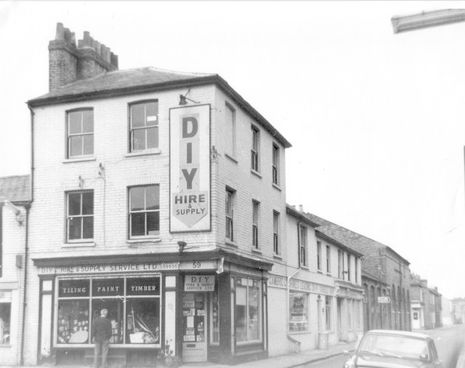Communities are the key in the fight against Cambridge’s dominance
In the face of a landlord university, community resistance is never futile

In June 2020, after being left derelict for more than a decade, a piece of land off Huntingdon Road was restored to life. Volunteers from Cambridge DIY, a group trying to support the city’s skateboarders, cleared the site and built their own skatepark. The area lacked any skating facilities, and after three months of being unable to come together in lockdown, the site was welcomed by the Cambridge skating community. A community garden soon appeared on the site, growing free produce for passers-by. Three weeks later, the skaters received a letter ordering them to vacate the site immediately by the owner of the land, Cambridge University. Today, the site is derelict once more.
If there’s one thing the University has been across its 800-year history, it’s consistent. Its attitude to people existing outside of its fortified colleges has existed on a spectrum of indifference to hostility. Where it once policed the town, it continues to hoard swathes of land in the city, keeping rents high and much of its land inaccessible. Where its vast wealth originated partially from colonial projects, so too does it now partner with corporations whose bottom line is built on the suffering of communities in the Global South. Its status as Europe’s wealthiest university has been secured on a legacy of dispossession and violence.
But there’s another common denominator in the University’s history. Every time it exerts its power to oppress, dispossess or enclose the local community, this power meets a strong resistance. This isn’t just about fighting back, as the project off Huntingdon Road shows us: it’s about building something new, outside of the spheres of university influence.
Jardine’s legacy is something that Jesus doesn’t mention once about her
In the 1970s, faced with the impending destruction of the Kite – a working-class area next to Christ’s Pieces – a consortium of dons and community members came together to buy 56 Fitzroy Street, and declared that they would not sell up at any price. Decades in the making, the demolition of the area had the backing of the council and major landowner in the area, Jesus College. The Grapevine Bookshop, as it became, was spearheaded by Jesus College’s first female fellow, Lisa Jardine, who defied her employer’s landlording interests to create a space for community activism and creativity, a hub for local campaigns to publish literature and organise. Resisting the University wasn’t just about preventing the construction of a shopping centre, it was about empowering the community, through the joy of reading, and, more importantly, the joy of action. Jardine’s legacy of community-building is something that her ex-employer, Jesus College, doesn’t mention once in its page about her, and, indeed, is the kind of resistance that the university establishment wants us to forget.
The University’s landlord wealth is built on the dispossession of land from communities. In a housing system in which everyone is alienated, individual tenants are more vulnerable to abuses of power. 45% of private tenants are victims of illegal behaviour, with eviction from private tenancies accounting for 78% of the rise in homelessness since 2011. 14% of private renters report symptoms of depression triggered by their living situation.
If the University’s power – and the power of wealthy landlords across the country – is the power to make people miserable, resistance to such power requires rediscovering joy. In its stranglehold on the city, a member of Cambridge DIY tells me, “the university is creating new neighbourhoods but not providing for them”. We must, then, start providing for ourselves.
Successive governments have done nothing but impoverish, exploit and neglect through austerity-programs and profit-driven legislation; many people find themselves unable to meet their most basic needs: food, shelter, warmth. Locally, amazing initiatives like Cambridge Community Kitchen have arisen to meet these needs. But such mutual-aid projects are, like Jardine’s Grapevine, about so much more than this. Chopping veg, cooking delicious food, cycling round the city to deliver it, aren’t just serving the community, they’re building it. Cooking together is a joyful experience: learning new skills collaboratively, hearing people’s stories, gossiping and putting the world to rights – these are the things we are denied when there are no spaces for us to come together.
Mutual-aid projects aren’t just serving the community, they’re building it
Land injustice is about two things: being alienated from the land, and, as a consequence, being alienated from each other. Common land accounts for just 3% of the country. Private corporations own six times that: 6.6 million acres of land. Oxbridge colleges own 126,000 acres of land, 0.39% of the country. Is it any wonder that we find ourselves so far removed from our neighbours?
And yet, despite ever-increasing alienation, in our shared political struggle we can find a new commons – a site for collective joy. That’s the spirit with which Cambridge DIY built their skatepark, it’s also the reason why resistance to the University has continued in spite of failure. Lisa Jardine and her comrades couldn’t stop the Kite from being demolished, but they bought local businesses and tenants more time with the people and places they loved.
We’re going to have to fight battles we won’t win. Though heartbreaking to witness, it’s okay if the things we build don’t last, because that’s only part of their purpose. In a system which doesn’t care about any of us, we organise, above all, to look after each other. Even if the projects we build are demolished, criminalised, or simply ignored, we can still create communities which do endure. That is never futile.
 News / Eight Cambridge researchers awarded €17m in ERC research grants27 December 2025
News / Eight Cambridge researchers awarded €17m in ERC research grants27 December 2025 News / Clare Hall spent over £500k opposing busway 24 December 2025
News / Clare Hall spent over £500k opposing busway 24 December 2025 Comment / League tables do more harm than good26 December 2025
Comment / League tables do more harm than good26 December 2025 News / Caius mourns its tree-mendous loss23 December 2025
News / Caius mourns its tree-mendous loss23 December 2025 Comment / The ‘class’ of Cambridge24 December 2025
Comment / The ‘class’ of Cambridge24 December 2025










